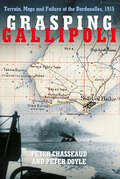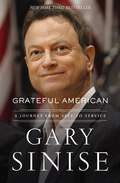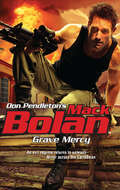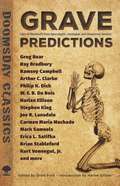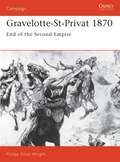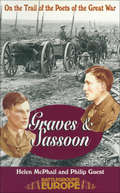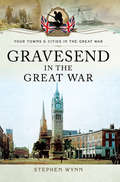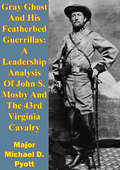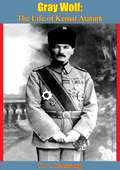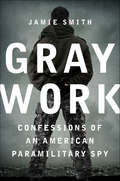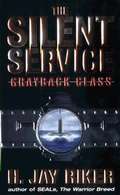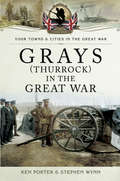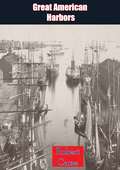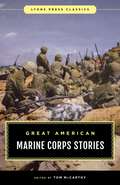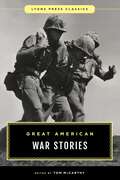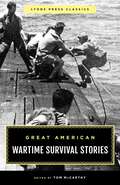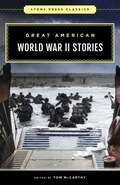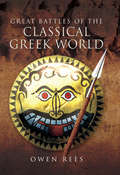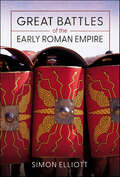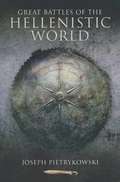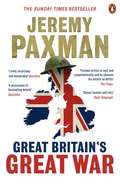- Table View
- List View
Grasping Gallipoli: Terrain, Maps and Failure at the Dardanelles, 1915
by Peter Doyle Peter ChasseaudThe failure of the Gallipoli campaign was instantly blamed on a great untruth – that the War Office was unprepared. This book, incorporating information unavailable elsewhere, shows that in fact the WO and the Admiralty had amassed a huge amount of data. Aerial reconnaissance had played a part – even Lawrence of Arabia had done his bit! The War Office knew all about Greek plans to capture the peninsula and one plan was even Anglo-Greek. The authors examine all the intelligence and how it was used or ignored and in the process, in the words of the late Richard Holmes they ‘illuminate a wildly beautiful landscape, which never fails to charm and shock me in equal measure.’
Grateful American: A Journey from Self to Service
by Marcus Brotherton Gary SiniseAs a kid in suburban Chicago, Gary Sinise was more interested in sports and rock 'n' roll than reading or schoolwork. But when he impulsively auditioned for a school production of West Side Story, he found his purpose--or so it seemed. Within a few years Gary and a handful of friends created what became one of the most exciting and important new theater companies in America. From its humble beginnings in a suburban Chicago church basement and eventual move into the city, the Steppenwolf Theatre Company launched a series of groundbreaking productions, igniting Gary's career along with those of John Malkovich, Joan Allen, Gary Cole, Laurie Metcalf, Jeff Perry, John Mahoney, and others. <p><p> Television and film came calling soon after, and Gary starred in Of Mice and Men (which he also directed) and The Stand before taking the role that would change his life in unforeseeable ways: Lieutenant Dan in the Academy Award–winning Forrest Gump.The military community's embrace of the character of the disabled veteran was matched only by the depth of Gary's realization that America's defenders had not received all the honor, respect, and gratitude their sacrifices deserve. <p> In the aftermath of the September 11 attacks, this became Gary's mission. While starring in hits like Apollo 13, Ransom, Truman, George Wallace, CSI:NY, and Criminal Minds: Beyond Borders, Gary has worked tirelessly on behalf of those who serve this country, entertaining more than a half million troops around the world playing bass guitar with his Lt. Dan Band, raising funds on behalf of veterans, and eventually founding the Gary Sinise Foundation with a mission to serve and honor America's defenders, veterans, first responders, their families, and those in need. <p> Grateful American is the moving, entertaining, profoundly gripping story of how one man found his calling: to see that those who defend this country and its freedoms are never forgotten. <P><b>A New York Times Bestseller</b>
Gratitude: Reflections on What We Owe to Our Country
by William F. Buckley Jr.William F. Buckley, Jr., "Mr. Conservative," believes that something must be done to revive our youth's indifference to today's government and politics. In "Gratitude" he offers a plan for universal voluntary national service for men and women 18 years of age and older. Here are his suggestions for how such a program might be structured and administered; on the inducements and sanctions appropriate to its realization; analysis of the benefits, material and spiritual, that would come to those who serve; and an idea of the benefits to those who are served.
Grave Mercy
by Don PendletonThe horror of the Ton Ton Macoute has returned. At its helm, a mastermind of religious fanaticism and military strategy who is plotting a swift, brutal invasion of a troubled island. Now the zealot is about to experience the Executioner's trademark version of hellfire.
Grave Predictions: Tales of Mankind's Post-Apocalyptic, Dystopian and Disastrous Destiny
by Arthur C. Clarke Stephen King Greg Bear Harlan Ellison Ray Bradbury Brian Stableford Ramsey Campbell Joe R. Lansdale Kurt Vonnegut Jr. W.E.B. Du Bois Carmen Maria Machado Drew Ford Erica L. Satifka Mark Samuels"This is a book of stories intended to describe that hand of mortal destruction in 16 utterly different, yet all apocalyptically stunning ways!"—Harlan Ellison, from the Introduction.These compelling visions of post-apocalyptic societies and dystopian worlds include short stories by some of the most acclaimed authors of our time. Among the noteworthy contributors and their works are Stephen King's "The End of the Whole Mess," "The Pedestrian" by Ray Bradbury, and Arthur C. Clarke's "No Morning After." The first-ever apocalyptic fantasy about global warming, "The End of the World," appears here, in translation from Eugene Mouton's 1872 French-language original. "The Pretence," by Ramsey Campbell, questions the nature and structure of everyday life in the aftermath of a doomsday prediction. In addition, thought-provoking stories by Philip K. Dick, Kurt Vonnegut, Jr., Greg Bear, Erica L. Satifka, and others offer an end-of-the-world extravaganza for fans of science fiction, horror, and fantasy.
Gravelotte-St-Privat 1870
by Philipp Elliot-WrightGravelotte-St-Privat was probably the hardest fought of all the battles of the Franco-Prussian War (1870-1871). Attacked by superior Prussian forces from both the First and Second armies, Marshal Bazaine's French Army of the Rhine inflicted heavy casualties on the advancing Prussian's before finally being forced to retreat into the fortress city of Metz. Unable to break out and with no hope of relief Bazaine's army grimly held on to the end of the war. French failure at Gravelotte-St-Privat led directly to their final defeat at Sedan, the collapse of Napoleon III's regime and the proclamation of the German Empire.
Graves & Sassoon: On the Trail of the Poets of the Great War (Battleground Europe)
by Helen McPhail Philip GuestThe war memoirs of these two officers with the Royal Welsh Fusiliers have never been out of print since their first publication. Both men won instant and enduring fame with these very different narratives, which made them two of the most influential participants in shaping later attitudes to the war. Graves gave offence in many quarters with his factual inaccuracies and/or slurs on various units of the British Army. Sassoon's nostalgic evocation of his cricketing and fox-hunting background contrast with the detailed narrative of personalities and life in the Battle of the Somme and the Battle of Arras. The thinly disguised names of real fellow officers are unravelled to help illustrate Sassoon's poetry and actions.
Gravesend in the Great War (Your Towns & Cities in the Great War)
by Stephen WynnGravesend was like most other towns in the UK during the course of the First World War. When the call came to serve King and Country, local men enlisted in their thousands, but sadly not all of them returned.This book gives an insight into the Tilbury to Gravesend Pontoon Bridge, which allowed the rapid deployment of troops in the event of a German invasion along the East Coast. It provided a quicker route to get troops, equipment and supplies from Essex into Kent for transportation across to France. It looks at the role both New Tavern and Shornemead Fort, part of the London Defence system, played in preventing the German Navy from carrying out direct attacks on London.There is an account of the Gravesend riots, in which groups of local people burnt and looted premises they believed belonged to German aliens who were residents in the town, and the unique story of Captain Robert Campbell, taken as a prisoner by the Germans early in the war. He was allowed home by the Kaiser to see his dying mother one last time, and voluntarily returned to captivity in Germany, on his word of honour to do so.The story of Sir Gilbert Parker, the wartime MP for Gravesend, is also told. He was instrumental in convincing America to join the war as a British Allie, which was no easy task, as the United States Justice Department estimated there were some 480,000 Germans living in America at the time.The book also tells the individual stories of Gravesend's men who fought in the war, some who survived and returned to their loved ones, and others who were not so fortunate. It documents the triumphs and tragedies of Gravesend's people as they sought to find normality amongst a reality far removed from anything they had ever known before.
Gray Eagles
by Duane UnkeferKnife-edge suspense, larger-than-life characters and kinky sex are the reliable ingredients in Unkefer's lengthy novel.
Gray Ghost And His Featherbed Guerrillas: A Leadership Analysis Of John S. Mosby And The 43rd Virginia Cavalry
by Major Michael D. PyottJohn Singleton Mosby led a successful partisan campaign during the American Civil War for the Confederacy. Prior to the war, Mosby was a frail nondescript lawyer. Entering the war as a private; Mosby eventually rose to the rank of Colonel. He organized, trained, and equipped the 43rd Virginia Cavalry, better known as Mosby's Rangers. This unit grew from nine men to almost nine hundred at the war's end, and conducted many daring celebrated raids on the Union forces and their supply lines. In addition to his raids Mosby provided accurate and timely intelligence to Major General J. E. B. Stuart and General Robert E. Lee throughout his service. This study is a leadership analysis of John Singleton Mosby using the U.S. Army's Field Manual 22-1 00, Army Leadership. The study examines Mosby's leadership development and evaluates him against the sixteen leadership dimensions that the Army currently uses to evaluate potential officers. The purpose of this study is to determine what leadership qualities Mosby possessed that contributed to his success. The study concludes that Mosby was able to influence subordinates, peers, superiors, and non-combatants; he provided a purpose and gave them direction and motivation; he also continuously sought ways to improve and expand the organization.
Gray Wolf: The Life of Kemal Ataturk (Select Bibliographies Reprint Ser.)
by H. C. ArmstrongMUSTAPHA KEMAL ATATURK, the great Turkish dictator, is a figure of great significance to the modern world. He did in Turkey what, in effect, Nasser and the other present-day “strong men” are trying to do in their countries, and he is their model and ideal. In fact, Nasser said of this book specifically “This has been the most important book in my life.”Besides being of great historical importance, this book, first published in 1933, is also a fascinating study of an extremely complex and controversial figure, in which an iron self-discipline and a sudden capacity for self-abandonment existed side by side and indeed reinforced each other.Richly illustrated with maps and drawings.“This has been the most important book in my life”—Gamal Abdel Nasser
Gray Work: Confessions of an American Paramilitary Spy
by Jamie SmithThe first ever, first-person story of America's private, paramilitary contractors at work around the world-from a man who performed these missions himself and has decades of stories to tell. This is a fascinating tale-and potentially the first-to describe the work of American contractors, men who run highly dangerous missions deep inside foreign countries on the brink of war. It will lift the veil and detail the ultimate danger and risk of paramilitary operations (both officially government-sanctioned and not) and show us in very intimate terms exactly what private soldiers do when the government can't act or take public responsibility. GRAY WORK combines covert military intelligence with boots-on-the-ground realism, following Jamie Smith through his CIA training and work as a spy in the State Department, to his co-founding of Blackwater following 9/11, to his decision to leave that company. As the founder and director of Blackwater Security, Smith's initial vision has undeniably shaped and transformed a decade of war. He argues that this gray area-and its warriors who occupy the controversial space between public and private-has become an indispensable element of the modern battlefield.
Grayback Class (Silent Service Series #1)
by H. Jay RikerThey call it the Cold War-but there are those who burn in its heat. The year is 1985, and two great superpowers-the U.S. and the U.S.S.R.-are locked in a lethal, escalating race of arms and technology. No war has been officially declared. But for those forced to fight in secret, it is do... or die. Reports have been received of a devastating new Soviet weapon. It is called Akula-a prototype attack submarine more advanced than anything in the U.S. undersea arsenal. Unchallenged, it will give America's enemies dominion over the Earth's waters-and an advantage that could prove nothing less than catastrophic to the Free World. Now America's greatest hope travels within the hull of a nearly obsolete Grayback Class submarine. A platoon of SEALs-the nation's most skilled fighting men-is heading into the jaws of the bear on a mission to penetrate Akula's home port, the heavily defended Severodvinsk shipyard on the White Sea. But it is the Grayback's, crew-along with the Navy men manning the accompanying Los Angeles class attack sub-who will be put through the most strenuous trials. For when the mission gets hot, it is the warriors of "The Silent Service" who will be called upon to fight their way out of impossible straits.
Grays (Your Towns & Cities in the Great War)
by Ken Porter Stephen WynnGrays (Thurrock) in the Great War tells the story of Grays and the wider Thurrock area from the outbreak of the Great War until the peace of 1918. The Docks at nearby Tilbury were the source of much employment in the area for both fathers and sons alike. They also played their part in the war, but not as a hub of military deployments.In May 1915 the German spy Augusto Alfredo Roggen, a Uruguayan born in Montevideo, arrived at Tilbury on board the SS Batavia, which had sailed from Rotterdam in Holland. On his arrival in England he made his way to Scotland to carry out his spying activities at the Loch Long torpedo range. He was captured, found guilty and executed by firing squad at the Tower of London on 17 November 1915.In July 1915 the German Naval officer and pilot, Gunther Plschow, made good his escape from Donington Hall POW camp in Leicestershire and made his way safely back to Germany by hiding himself on board one of the many ships that sailed from Tilbury. He became the only German POW to escape from Britain and make it back to Germany during the First World War.The Kynochs munitions factory was situated near Fobbing on the site of what had previously been Borleys Farm. The site, which made shell cases, detonators, cordite and acetone for the British war effort, was so vast that it included its own housing estate for its workers, a hospital and a railway line. It became so big that it actually became known as Kynochtown and was a major source of employment in the area, particularly for women.There were Prisoner of War camps at Horndon House Farm, Puddledock Farm and Woodhams Quarry in West Thurrock which housed over 150 German prisoners.The Thurrock area also played an important part of protecting London from seaborne invasion up the River Thames with the help of Tilbury Fort and Coalhouse Fort at East Tilbury.
Great American Fighter Pilots of World War II
by Robert D. Loomis General Robert Lee Scott Jr.During World War II American fighter pilots ranged fiercely and bravely over most of the seas and continents of the world. They escorted our bombers, protected carriers and land bases and --whether alone or skillfully teamed together they fought to win and hold control of the air , without which no final victory was possible . In Great American Fighter Pilot of World War II, Robert Loomis presents a vivid, sweeping picture of the war fought by our ace fighter pilots from Pearl Harbor to China, from Casablanca to Berlin. as he moves form theater to theater, from service to service, he recounts the thrilling air battles of such famous pilots as Dick Bong, Don Gentile, David McCampbell, "pappy" Boyington and Bob Scott. Here is an exciting book which pays tribute to the skill and courage of the American fighter pilot, and dramatizes the important part he played in the overall strategy of the world's greatest war.
Great American Harbors
by Robert CarseGreat American Harbors by Robert Carse is a captivating exploration of the United States' most significant harbors, showcasing their vital role in shaping the nation's history, economy, and culture. From bustling ports like New York and San Francisco to lesser-known but historically rich harbors, Carse brings these maritime gateways to life with vivid storytelling and historical insight.The book delves into the origins and development of these harbors, tracing their transformation from modest trading posts to thriving centers of commerce and industry. Carse highlights the human stories that define these harbors, from the sailors and dockworkers who built their livelihoods there to the merchants and visionaries who expanded their reach across the globe. He also explores how these harbors became strategic hubs during wartime and pivotal points in America’s maritime heritage.With a keen eye for detail, Carse captures the unique character of each harbor while illustrating their shared importance in fostering trade, immigration, and cultural exchange. Richly descriptive and thoroughly researched, Great American Harbors is both a tribute to the enduring significance of these maritime landmarks and a celebration of the vibrant stories they hold.This book is an engaging read for history enthusiasts, maritime aficionados, and anyone fascinated by the waterways that have connected America to the world.
Great American Marine Corps Stories
by Tom McCarthyOn November 10, 1775, the Continental Congress approved a resolution for the organization of the Corps, creating what would become the Marines, a heroic group of men and women who put their lives on the line in far-flung places around the globe. Here are ten unforgettable stories on the courage of America&’s finest fighting force. These visceral accounts have one thing in common: heroism in its purest form. You will find in this eminently readable collection stories of Marines at Belleau Wood in France during World War I, and on to breathtaking and heartbreaking action on Iwo Jima. Here also are Marines making a surprise amphibious landing at the strategic port of Inchon during the Korean War, besieged Marines at Khe Sanh in Vietnam under attack for six months, and unsung heroes in unknown battles from the First Gulf War to Marine snipers in Haiti, Somalia, and Afghanistan. This riveting collection brings out in wrenching detail why Admiral Chester Nimitz described the Marines at the Battle of Iwo Jima thusly: &“Uncommon valor was a common virtue.&” Riveting and inspiring, Great American Marine Corps Stories is a must-read for historians, Marines, and lovers of adventure.
Great American War Stories
by Tom McCARTHYGreat American War Stories is a magnificent collection of gripping accounts of battles great and small throughout history. Capturing all the elements of ancient and powerful tragedy, this book is chock-full of thrilling tales of war—as well as a frightful examination of man's darkest impulses—allowing the reader a gruesome glimpse behind the veil of honor and bravery that history often ascribes to soldiers and their leaders. These are all stories that have endured the test of time and have attracted discerning readers for generations.
Great American Wartime Survival Stories
by Edited by Tom McCarthyCourage is not the absence of fear but rather the ability and pluck to face fear and move on. Great American Wartime Survival Stories is an extraordinary collection of stories presenting indefatigable human beings caught in circumstances that summoned extraordinary resilience and strength: a plane crash in the jungles of Burma, a Pacific typhoon, perilous flight from Confederate soldiers intent on killing the enemy. The heroes within these stories are unflappable, gifted with the strength and perseverance to calmly face their Maker and move ahead. Within each of these enduring stories is an uplifting lesson on the human condition. Here, among the ten riveting stories in this collection, you will read of a group of imprisoned American sailors trapped in a foul Philippine jail at the turn of the 19th century; an account of two Union prisoners on the run making their way through Confederate territory; and the men on American naval ships caught in a typhoon during World War II. Other stories include a young mother caught in the siege of Vicksburg; the survivors of the torpedoed USS Indianapolis floating helplessly in the shark-infested waters of the Pacific; and the brave and unsuspecting soldiers in and around Pearl Harbor on December 7, 1941. Great American Wartime Survival Stories is, more than anything, an inspiring collection of hope from those who made it through the most trying of circumstances.
Great American World War II Stories (Lyons Press Classics)
by Edited by Tom McCarthyHere are stunning long-buried stories that give proof to the words Admiral Chester Nimitz used to describe the hero Marines on Iwo Jima: &“Uncommon valor was a common virtue.&” Painstakingly selected from the most moving battle accounts about American heroism and breathtaking courage during the largest war in world history, this anthology brings readers to the front lines in inspiring detail.Courage, duty, and honor became watchwords for Americans in combat—most of whom were volunteer soldiers, sailors and Marines. Freedom and principle mattered more than their own lives. Moving, emotional, and gripping, Great American WWII Stories offers hidden gems from major battles like Iwo Jima and Okinawa. It puts readers on Omaha Beach during D-Day. But here also is the story of USS Nautilus, which engaged the Japanese on fourteen different patrols, from the Battle of Midway to the liberation of the Philippines. Here too is the story of Operation Tidal Wave, the bloodiest air battle in the history of war; and a gripping account of American paratroopers, isolated behind enemy lines, fighting the elite German SS in Normandy after D-Day. Great American WWII Stories is a magnificent collection of gripping accounts of battles great and small. It is tribute to Americans who were willing to risk it all, and in many cases did.
Great Battles of World War I: In the Air
by Frank C. PlattA unique anthology of stories compiled by Platt of aerial combat witnessed during World War I. It records the personal experiences of these first air-borne fighters. Men like Eddie Rickenbacker, Billy Mitchell, and William A. Bishop describes the perilous missions that made them legends in their own time. Here are the death-defying encounters; the one-man machines; the flaming, mortal combat in which each fighter singled out his esteemed adversary. Here are the great air battles of World War I and the daring aces who began a new era of warfare -- began it with a spirit of chivalry and gallantry that now belongs to a past age.
Great Battles of the Classical Greek World
by Owen ReesThis book presents a selection of eighteen land battles and sieges that span the Classical Greek period, from the Persian invasions to the eclipse of the traditional hoplite heavy infantry at the hands of the Macedonians. This of course is the golden age of the hoplite phalanx but Owen Rees is keen to cover all aspects of battle, including mercenary armies and the rise of light infantry, emphasising the variety and tactical developments across the period. Each battle is set in context with a brief background and then the battlefield and opposing forces are discussed before the narrative and analysis of the fighting is given and rounded off with consideration of the aftermath and strategic implications. Written in an accessible narrative tone, a key feature of the book is the authors choice of battles, which collectively challenge popularly held beliefs such as the invincibility of the Spartans. The text is well supported by dozens of tactical diagrams showing deployments and various phase of the battles.
Great Battles of the Early Roman Empire
by Simon ElliottFrom renown Roman historian, Dr. Simon Elliott presents eight of the greatest, most significant battles from the first two and a half centuries of Rome's Imperial period. Dr Simon Elliott describes eight of the greatest, most decisive of the Roman Empire of the first to third centuries. The list includes battles fought from the highlands of Scotland and the forests of Germany to the deserts of the Middle East. They show how the vaunted Roman legions adapted to extremes of terrain and climate as well as a wide array of very different foes, from the wild Caledonian tribes to the sophisticated, combined-arms armies of Sassanid Persia with their war elephants and superb cavalry. Some of the battles even pit the Roman legions against their own kind in brutal civil wars. After an introductory chapter on the Imperial Roman army, detailing its organization, equipment, tactics and doctrine, the author moves on to describing each battle in detail. He sets the strategic context and background of the chosen engagement before analysing the size and composition of the opposing forces, also detailing the nature of the enemy faced. The manoeuvres leading up to the battle are described, followed by deployment and the course of the fighting itself. Finally, the aftermath and implications of the battles outcome are assessed. The well-researched and engaging text is supported by clear maps.
Great Battles of the Hellenistic World: Memoirs Of A Red Army Tank Commander
by Joseph PietrykowskiAn exploration of 17 critical military conflicts of the Hellenistic period in Western civilization. For almost two centuries, the Macedonian phalanx, created by Philip II and refined by his son, Alexander the Great, dominated the battlefields of the ancient world from the sweltering riverbanks of India to the wooded hills of Italy. As the preferred weapon of some of antiquity&’s greatest commanders, this powerful military system took center stage in many of the largest and most decisive conflicts of ancient times. In Great Battles of the Hellenistic World, Joseph Pietrykowski explores the struggles that shook the ancient world and shaped history. From the structure and composition of the opposing armies, to the strategy of their campaigns, to the leadership decisions and tactics that decided the engagements, Great Battles of the Hellenistic World examines seventeen landmark conflicts from Chaironeia to Pydna over the course of 170 years of bloody warfare.&“The writing is quite lively and interesting. . . . Of value to war-gamers because he sets the stage well and there is a lot of tactical detail. . . . An enjoyable book to read.&” —Bryn Mawr Classical Review
Great Britain's Great War
by Jeremy PaxmanJeremy Paxman's magnificent history of the First World War tells the entire story of the war in one gripping narrative from the point of view of the British people.***We may think we know about it, but what was life really like for the British people during the First World War?The well-known images - the pointing finger of Lord Kitchener; a Tommy buried in the mud of the Western Front; the memorial poppies of Remembrance Day - all reinforce the idea that it was a pointless waste of life. So why did the British fight it so willingly and how did the country endure it for so long?Using a wealth of first-hand source material, Jeremy Paxman brings vividly to life the day-to-day experience of the British over the entire course of the war, from politicians, newspapermen, campaigners and Generals, to Tommies, factory workers, nurses, wives and children. It shows how both British life and identity were utterly transformed - not always for the worst - by the enormous upheaval of the war.Rich with personalities, surprises and ironies, this lively narrative history paints a picture of courage and confusion, doubts and dilemmas, and is written with Jeremy Paxman's characteristic flair for storytelling, wry humour and pithy observation.***"A fine introduction to the part Britain played in the first of the worst two wars in history. The writing is lively and the detail often surprising and memorable" Guardian"He writes so well and sympathetically, and chooses his detail so deftly, that if there is one new history of the war that you might actually enjoy from the very large centennial selection this is very likely it" The Times
